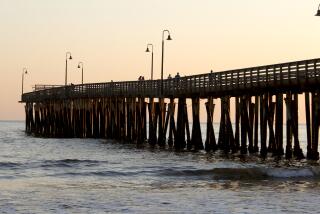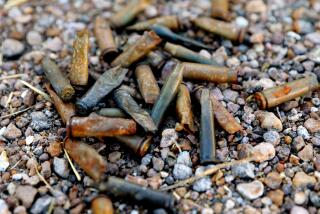A Soft Sell on the Greener Grass in Costa Rica ‘Oasis’
- Share via
VENTURA — Nearly 70 people are jammed into the reading area of the region’s newest public gathering place, the Barnes & Noble bookstore, and none of them are reading. Instead, they’re listening to an author sell his subject, a subject built on a dream:
“Down in Costa Rica, there is no ‘Yankee Go Home,’ ” says Christopher Howard, formerly of Costa Rica and more recently of Thousand Oaks.
“It’s very Americanized, with Taco Bells, Pizza Hut, satellite TV. It’s the kind of place in which you can stay connected while living in a different culture.”
He pauses a moment, looks at row upon row of rapt middle-aged faces.
“I mean, they actually celebrate Halloween.”
*
It’s the soft sell, obviously. Howard, co-author of “The Golden Door to Retirement and Living in Costa Rica,” knows people everywhere like the familiar--even when they’re leaving everything familiar.
Dreams have that power. Dreaming actually can suspend one’s ability to anticipate reality.
Retirees for years have flocked to Florida and Arizona and New Mexico--all for the lures of affordable housing and welcoming climates. But Florida is about to sink under gray hair, and adult developments of the Southwest are filling up and getting more expensive. There’s just no greener grass on the other side of the hill.
Costa Rica has enjoyed a well-deserved reputation as an oasis of sorts. Situated deep in Central America, its climate is lushly tropical, its government democratic, its national security held in place without an army, its people open and friendly, its very identity one of civility. Put another way, it’s a Latin American state without political unrest, the threat of coup or hang-ups about Americans who have more money in IRAs than locals might earn in a lifetime.
And then, the clincher. Costa Rica has long been known to be a relative bargain, a place where housing is cheap and the cost of food even cheaper.
The grass gets greener.
*
The sixtyish man with white hair wanted to know about health care.
“It’s socialized,” says Howard. “You need bypass surgery? It’s covered. Plastic surgery? They have some of the best in the world. It’s all covered for a monthly premium of $20 to $30.”
The fiftyish woman in the red and blue print dress wanted to know about safety, security, the ability to move about freely.
“Dangerous? No,” says Howard. “There’s some burglary--that happens everywhere. But there are no drive-by shootings or things like that--that all happens here. It is much safer than the typical American city.”
A rugged, sinewy hiker type in shorts asks about currency and Costa Rican banks.
“You can convert your money and buy CDs in Costa Rica’s excellent, stable banking system. Even after conversion, you’ll earn the equivalent of 16% to 18% in interest.”
Language. More than one of those listening to Howard want to know about English proficiency in Costa Rican culture.
Howard, who once taught high school Spanish in Northern California, fields this one with authority. In 1985 he opened a language school in San Jose, Costa Rica’s main city and capital, and sold it in 1987.
“There are 25,000 resident English-speakers,” he says. “But you will, in fact, have a better life if you speak some Spanish. You’ll communicate with the people, you’ll be able to attend the theater, you’ll be able to get a buy at the market. There’s a ‘Gringo Grapevine,’ which makes it easy to meet people, and two English-language newspapers. But it’s worth it to learn some Spanish.”
And then housing. Everyone present wants to know what it costs to live.
Howard estimates it at 60% of the cost here in Southern California. Indeed, he makes it sound better than that.
“Obviously, if you’re an attorney and accustomed to living in a $300,000 house here and want to maintain that standard, it can be expensive. But a retired couple can live very nicely on $1,500. You can rent a decent apartment for $600 or $700 or buy a small house for $30,000.”
*
That’s when the woman with the large green hat mutters “that would be a dump.”
The woman with the green hat is from Oxnard and living in Costa Rica part time. She’s a Costa Rica fan but also a New World realist. She says prices are considerably higher for safe, well-appointed places.
After the talk, she discusses the real ins and outs of living where grass is greener with Craig R. McClean, an orthopedic surgeon practicing in Oxnard. McClean also spends time in Costa Rica--he’s joined others in building a hotel and restaurant there.
“I’m tired of everyone here sitting around bitching about medicine,” he allows. “This is my way of branching out a bit, doing something new.
“It’s a beautiful place, down there,” he continues. “But it can take some money. There’s burglary everywhere. Leave nothing in your car at any time. And you can’t leave your house unattended.”
To which the woman in the green hat nods and allows as how she and her husband share with neighbors the cost of a private guard to keep watch on their houses when unoccupied.
“Everybody has a dream,” Howard later says. “Everybody’s looking for something. Obviously, you can’t escape your troubles here and find answers there. But it is an oasis.”
Like so many that have come before it, greener grass and all.
More to Read
Sign up for Essential California
The most important California stories and recommendations in your inbox every morning.
You may occasionally receive promotional content from the Los Angeles Times.













